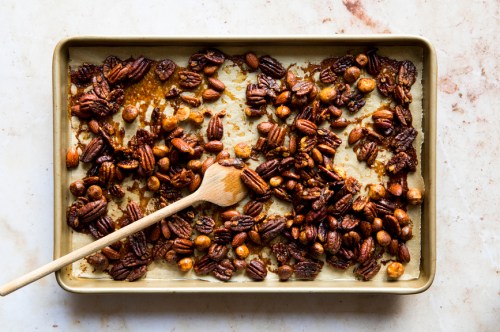Sorry, but Your Nuts Are Probably Rancid—Here’s How To Keep Them Fresh for Months on End
You may be surprised to hear that you’ve been storing almonds wrong all along—here’s how to store nuts to keep them fresher for longer.

When mindlessly scrolling through TikTok, it doesn’t take long for us to have yet another “I was today years old” moment and discover something totally new. Recently, while watching one of those aesthetically-pleasing refrigerator haul videos (just me?), I happened to notice something that stood out like a fish out of water. And it was nuts.
Ready for it? Apparently, most of us have been storing nuts wrong. Bummer, seeing as they’re basically the perfect heart-healthy nosh, and we’d hate to think we’ve been shortening their shelf-life all along.
While you may already be putting in the extra effort to transfer your bag of almonds into one of those fancy glass airtight containers and plopping it in the pantry, it turns out that this *isn’t* actually the best way to store nuts. Rather, they should be living in the chillest part of your home. Catching my drift?
How to store nuts so they stay fresher for longer
TL; DR: Store your nuts in the fridge, folks.
In a recent TikTok video by @upcloseandhealthy, Zeina Maktabi, a functional nutritionist, shares how to store nuts like pecans and almonds to keep them as fresh as possible. The trick is beyond simple—the refrigerator will significantly extend their shelf-life. This simple step can be the determining factor between quickly spoiled-slash-rancid nuts versus crisp, crunchy, and tasty ones that last for months on end.
So, why does the fridge make such a difference? According to Maktabi, nuts contain delicate heart-healthy unsaturated fats that are sensitive to heat, light, and air. When in contact with these environmental elements for prolonged periods, it makes nuts more susceptible to spoilage, which means they’re likely going to exhibit bitter, rancid flavors before you get a chance to enjoy them. When stored in the refrigerator, nuts (shelled or unshelled) can last anywhere between six months to a year.
A few more nut storage tips to keep in mind
This golden rule applies to nut flours and seeds, too. Maktabi says that this fridge storage recommendation also applies to nut flours and seeds (like flaxseeds or chia), whether or not the label on the packaging points this out explicitly. These ingredients also contain sensitive fats prone to spoilage when exposed to heat and oxygen.
Store them in airtight containers. For added nut-freshness-security purposes, Maktabi recommends always storing nuts in airtight containers to reduce further exposure to oxygen or harsh fans that may impact their freshness. So even though those fancy glass canisters look gorgeous, they definitely won’t keep your nuts tasting anything close to that if they’re not actually airtight.
Avoid buying in bulk. Now that we know exactly how delicate nuts can be, it’s best to avoid buying in bulk unless you intend to eat them soon-ish. Although a Costco-sized bag might be a great deal for pricy nuts, it might not be the most practical solution, especially when you consider the amount of space they’ll occupy in the confinements of a small fridge.
Steer clear of self-serve bins at the market. Try to avoid the self-serve bins at the supermarket, as there’s no real way to know how long the nuts have already been exposed to the elements (like oxygen) before they even make it to your home. Opt for sealed bags instead.
You can freeze them, too. Now, if you somehow end up with a heaping amount of nuts and don’t have enough room to store them in your fridge, you can also pop them in the freezer to help prolong their shelf life for up to a year.
Is this RD nuts about PB, or not? Find out here:
Sign Up for Our Daily Newsletter
Get all the latest in wellness, trends, food, fitness, beauty, and more delivered right to your inbox.
Got it, you've been added to our email list.










